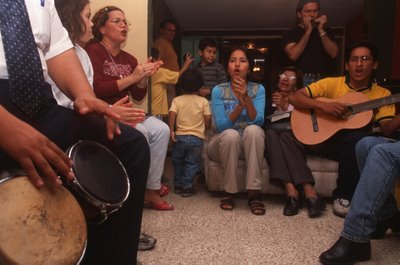Why offer alternatives to monologue preaching from behind pulpits? After all, monologue is the only style that many Christians know. Few realize that the Word of God sets forth very different styles of teaching that have proven to be consistently more effective.
...The sermon, as a form of monologue, preached by paid specialists, has mostly replaced New Testament practices for teaching believers. Eloquent and persuasive preachers of monologue sermons have often swayed audiences and nations, and God has used His Word to win and edify many with such messages. However, where churches and cells reproduce in great numbers — as is the case in many lands today — few are able to preach well by monologue. Most who try to preach monologues communicate poorly, set an example that others cannot easily follow, and fail to make disciples.
Both the New Testament and church planting movements offer very effective alternatives to the monologue. As mentors of emerging leaders of new congregations, we should be able to train others in these alternatives.
Dialogue. (Acts 17:2; 20:7; 17:11; 24:25) The apostles preferred to “dialogue” with both seekers and believers, both individuals and groups. Dialogue, conversations with a purpose, allow a teacher to answer folk’s questions, allay their fears, inform their ignorance, appeal to their conscience, and help them choose what they will do. Believers are to teach and instruct “one another” (Col. 3:16; Rom 15:14). Dialogue is easier to do in small groups than in big congregations. Since most folks already know how to dialogue with their friends and relatives, doing so is a superior way to share about Jesus and the way of life that He calls everyone to follow.
Gifts of the Spirit. (1 Cor 12:7; 14:24-26) A primary task of those who shepherd flocks is to ensure that all the believers have time and opportunity to serve one another. In doing so, their gifts of the Spirit will “manifest” and many will be helped and strengthened. In fact, as all the believers share one with another, even unsaved folks who listen to them will see their own need and turn to Jesus. Gifts of the Spirit manifest more readily in small groups where believers see each other face-to-face and have freedom to speak one to another.
Demonstrations of power. (1 Cor 2:1-5; 1 Thes 1:4-6) The reality and truth of the Word of God are learned more from experience than by listening to logical discourses. One of the main tasks of those who shepherd flocks is to ensure that all the believers have time and opportunity to pray for one another, and to show love within their worship. As they do so, the Holy Spirit will work many miracles of healing and deliverance.
Drama and role play. Drama and story-telling remain universally appealing to all classes of society, and are a preferred leaning style in many of the more neglected societies. Men and women, young and old, can act out Bible stories that illustrate every major doctrine of Christianity. So doing also allows children to participate actively in worship. Brief role plays, presented with little preparation and without costumes, can prove both entertaining and evocative. A skit, followed by reading a Bible text, can open up discussion and help folks to apply truth to their lives and work. Furthermore, even the newest believers can participate.
Questions and answers. Folks have genuine questions and issues for which they seek help and answers. If we cannot answer a question, then let us admit so and promise to find answers.
If you would like to subscribe to MentorNet to receive these mailings regularly from Patterson/Currah, send an email to subscribe@mentornet.ws
They have recently begun a blog at http://mentornetblog.blogspot.com
They have recently begun a blog at http://mentornetblog.blogspot.com




